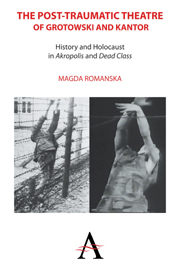 The Post-traumatic Theatre of Grotowski and Kantor
The Post-traumatic Theatre of Grotowski and Kantor from Part II - Our Memory: Kantor's Dead Class
In his review of Dead Class, Bogdan Gieraczyński confidently wrote that “Dead Class is the most important and original Polish spectacle of the last decade. It is also one of the most famous, one which I believe will have a long and illustrious life abroad.” Shortly after its Polish premiere, Dead Class toured Holland, West Germany, France, Iran, Yugoslavia, Belgium, Italy, Australia, Venezuela, the USA, Switzerland and Mexico. It played in London, Paris, Amsterdam, Nancy, Belgrade, Milan, Syndey, Barcelona, Graz, Lyon, Lille, Stuttgart, Majorca, Caracas and New York City. In June, 1981, six years after its premiere, Dead Class was reported as having been performed 550 times worldwide. Altogether, in the 17 years of its travels, the spectacle played over 2000 times all over the world.
In the first week of the Edinburgh Festival, Dead Class won the Scotsman award for originality and high artistic value. Reviews were unanimously positive: “The visual impact of the performance is tremendous. […] it is quite simply agonizing. […] simply astounding” – wrote Fringe's Brian Barron. Gordon Parson of the Morning Star called the show “Outstanding.” An anonymous account of Cricot 2's visit to Edinburgh reveals the level of anticipation surrounding Kantor's show:
[The] enthusiasm of some informal Scottish cultural circles resulted in special care offered to the actors who were provided, for instance, with extremely attractive though distanced (over 30 kms from Edinburgh) lodgings in an old Scottish manor house of Mrs. Matilda O'Brien at Peebles. [The i]nitiative, devotion and personal commitment of Richard Demarco, owner of the art gallery and David Gothard, a young stage director, helped enormously to build an excellent atmosphere around the Polish troupe. The Edinburgh premiere was honoured by the presence of the Polish Ambassador to Great Britain, Mr. Artur Starewicz.
To save this book to your Kindle, first ensure [email protected] is added to your Approved Personal Document E-mail List under your Personal Document Settings on the Manage Your Content and Devices page of your Amazon account. Then enter the ‘name’ part of your Kindle email address below. Find out more about saving to your Kindle.
Note you can select to save to either the @free.kindle.com or @kindle.com variations. ‘@free.kindle.com’ emails are free but can only be saved to your device when it is connected to wi-fi. ‘@kindle.com’ emails can be delivered even when you are not connected to wi-fi, but note that service fees apply.
Find out more about the Kindle Personal Document Service.
To save content items to your account, please confirm that you agree to abide by our usage policies. If this is the first time you use this feature, you will be asked to authorise Cambridge Core to connect with your account. Find out more about saving content to Dropbox.
To save content items to your account, please confirm that you agree to abide by our usage policies. If this is the first time you use this feature, you will be asked to authorise Cambridge Core to connect with your account. Find out more about saving content to Google Drive.